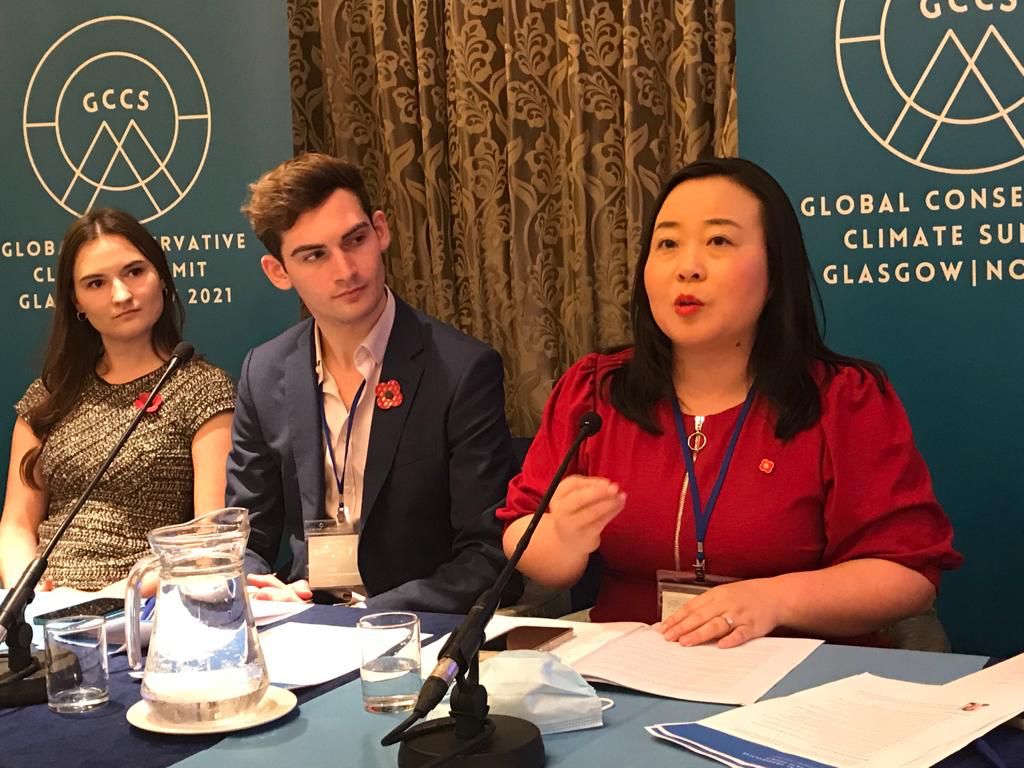Legislators have the responsibility to leave the planet better and greener for the next generation, Canberra Liberals leader Elizabeth Lee told the world in her speech at COP26 in Glasgow last month.
Ms Lee attended COP26 as a delegate of the Coalition for Conservation, an environmentalist forum for centre-right and conservative politicians who support decarbonization.
Four hours after she arrived in Scotland, following a 30-hour flight, Ms Lee spoke at the GLOBE International Legislators Summit about the role of sub-national legislation in combating climate change.
Sub-national governments (like the ACT’s) led the way when it came to cutting carbon, Ms Lee said in her speech, and she was proud the ACT had strong tripartite agreement on climate action. The ACT had achieved renewable energy by 2020, and was committed to zero net emissions by 2045. These were ‘ambitious’ targets, and the ACT politicians were ambitious, Ms Lee said – “But the reason we are, is that we can.”
Being the only representative from the ACT was a privileged position, Ms Lee told Canberra Daily.
“I wanted to make sure that I flew the flag for the ACT and Australia, not in a party-political manner at all,” she said.
“It’s important for us to continue to work together, and not be divided when it comes to action on climate change.”
Ms Lee also gave the opening keynote address at the Youth Environment Summit in Edinburgh, about the importance of youth voices from across the political spectrum. The young people she met were concerned about the future of the planet, but also about their economic prosperity, she observed. Younger people, she thought, were more engaged than her generation.
“For us, it seems to be a fairly recent discussion point, especially in the public eye, but our young people have probably lived it all their lives; it’s the future they will live in; and their voices are important when it comes to how we get there.”
Ms Lee then attended the Global Conservative Climate Summit in Glasgow, which assembled centre-right legislators from the Anglosphere, Europe, and Asia who cared about climate change, and wanted serious policies to reduce our carbon footprint.
“Other countries have been able to take the debate from not whether we should go carbon neutral, but to how we get there,” she said. “Not that I had any doubts … but for politicians in those countries, it wasn’t even a question.”
In Australia, Ms Lee said, the debate about climate change is “still fairly political – and that’s a bit of a shame”. But overseas, the heat had been taken out of the debate about climate change. Here, there are alarmist and extremist positions on both sides of politics; Ms Lee found it refreshing to step away from extremism, and instead discuss “sensible, pragmatic, practical, tangible” policies to get to carbon neutral, and in a way that keeps the economy strong.
“That was a real eye-opening experience, especially seeing the centre-right parties taking a lot of leadership and control in this space,” she said.
In fact, Ms Lee said, the UK was a good example of a centre-right government (the Tory Party) taking strong action on climate change. Their economy was “going from strength to strength”; some people had feared pursuing action on climate change would come at the cost of the economy, but, former prime minister Theresa May said, “economic growth comes hand in hand with pursuing action on climate change”.
The conferences also made Ms Lee realise the importance of having diverse voices in the debate – not simply in terms of political ideology, but of professional background, gender, ethnicity, and urban-rural.
“It is a global problem that requires a global solution.”
At the Conservative summit, Ms Lee signed the Centre-Right Climate Action Declaration, calling for business and free market incentives for responsible businesses and individuals to take up technological and nature-based solutions to the climate crisis.
“The left of politics seem to think [climate change] is their arena,” Ms Lee said. “It’s too important for the right side of politics to go MIA.”
In fact, Ms Lee said, the Liberals had a long history of strong action when it comes to protecting our natural environment.
The Canberra Liberals were the first sub-national government to sign up to the Kyoto Protocol, she pointed out, while their commitment to ACT interim targets to net zero by 2045 was more ambitious than Federal Labor’s policies (cutting greenhouse gas emissions by 43 per cent by 2030). (Labor’s targets are higher than the Coalition’s target of 26 to 28 per cent emissions reduction on 2005 levels by 2030, and projected cut of 30 to 35 per cent by the end of the decade.)
Historically, Liberal politicians like John Gorton, Robert Hill, Chris Puplick, and John Carrick were strong advocates for environmental protection and lowering emissions. (Matt Kean, Simon Birmingham, and Marisa Payne also want climate action, according to Inside Story.) Today, Coalition for Conservation founder Kristina Photios has said only a handful of Liberal politicians oppose climate action, and most believe we must act.
At COP26, Ms Lee heard from Boris Johnson and Theresa May, who argued that conserving the environment was a core and fundamental conservative value, and that it was the rightful home of the right side of politics to be deeply engaged with this topic.
“It is our environment; it is our future; and we all have a say in how we protect it,” Ms Lee said.



